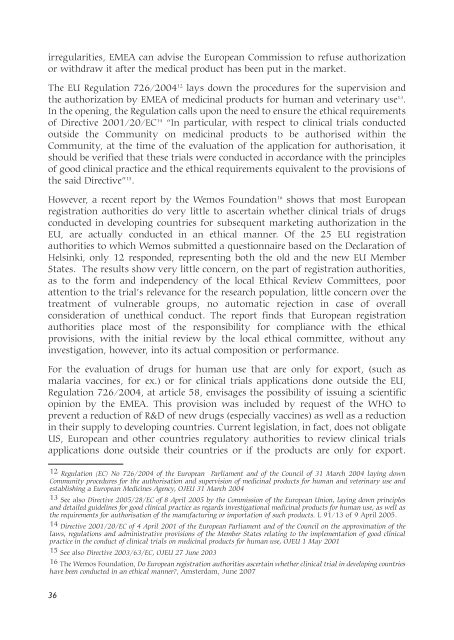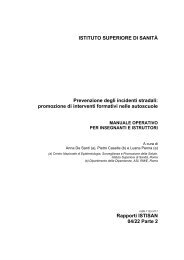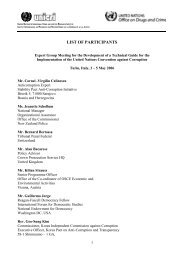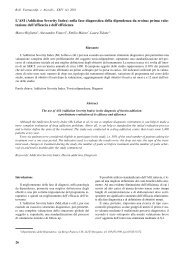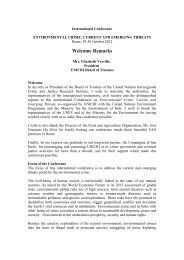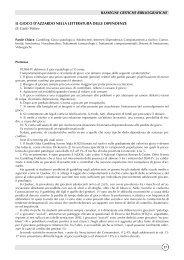Biomedical Research in Developing Countries - UNICRI
Biomedical Research in Developing Countries - UNICRI
Biomedical Research in Developing Countries - UNICRI
You also want an ePaper? Increase the reach of your titles
YUMPU automatically turns print PDFs into web optimized ePapers that Google loves.
irregularities, EMEA can advise the European Commission to refuse authorization<br />
or withdraw it after the medical product has been put <strong>in</strong> the market.<br />
The EU Regulation 726/2004 12 lays down the procedures for the supervision and<br />
the authorization by EMEA of medic<strong>in</strong>al products for human and veter<strong>in</strong>ary use 13 .<br />
In the open<strong>in</strong>g, the Regulation calls upon the need to ensure the ethical requirements<br />
of Directive 2001/20/EC 14 “In particular, with respect to cl<strong>in</strong>ical trials conducted<br />
outside the Community on medic<strong>in</strong>al products to be authorised with<strong>in</strong> the<br />
Community, at the time of the evaluation of the application for authorisation, it<br />
should be verified that these trials were conducted <strong>in</strong> accordance with the pr<strong>in</strong>ciples<br />
of good cl<strong>in</strong>ical practice and the ethical requirements equivalent to the provisions of<br />
the said Directive” 15 .<br />
However, a recent report by the Wemos Foundation 16 shows that most European<br />
registration authorities do very little to ascerta<strong>in</strong> whether cl<strong>in</strong>ical trials of drugs<br />
conducted <strong>in</strong> develop<strong>in</strong>g countries for subsequent market<strong>in</strong>g authorization <strong>in</strong> the<br />
EU, are actually conducted <strong>in</strong> an ethical manner. Of the 25 EU registration<br />
authorities to which Wemos submitted a questionnaire based on the Declaration of<br />
Hels<strong>in</strong>ki, only 12 responded, represent<strong>in</strong>g both the old and the new EU Member<br />
States. The results show very little concern, on the part of registration authorities,<br />
as to the form and <strong>in</strong>dependency of the local Ethical Review Committees, poor<br />
attention to the trial’s relevance for the research population, little concern over the<br />
treatment of vulnerable groups, no automatic rejection <strong>in</strong> case of overall<br />
consideration of unethical conduct. The report f<strong>in</strong>ds that European registration<br />
authorities place most of the responsibility for compliance with the ethical<br />
provisions, with the <strong>in</strong>itial review by the local ethical committee, without any<br />
<strong>in</strong>vestigation, however, <strong>in</strong>to its actual composition or performance.<br />
For the evaluation of drugs for human use that are only for export, (such as<br />
malaria vacc<strong>in</strong>es, for ex.) or for cl<strong>in</strong>ical trials applications done outside the EU,<br />
Regulation 726/2004, at article 58, envisages the possibility of issu<strong>in</strong>g a scientific<br />
op<strong>in</strong>ion by the EMEA. This provision was <strong>in</strong>cluded by request of the WHO to<br />
prevent a reduction of R&D of new drugs (especially vacc<strong>in</strong>es) as well as a reduction<br />
<strong>in</strong> their supply to develop<strong>in</strong>g countries. Current legislation, <strong>in</strong> fact, does not obligate<br />
US, European and other countries regulatory authorities to review cl<strong>in</strong>ical trials<br />
applications done outside their countries or if the products are only for export.<br />
12 Regulation (EC) No 726/2004 of the European Parliament and of the Council of 31 March 2004 lay<strong>in</strong>g down<br />
Community procedures for the authorisation and supervision of medic<strong>in</strong>al products for human and veter<strong>in</strong>ary use and<br />
establish<strong>in</strong>g a European Medic<strong>in</strong>es Agency, OJEU 31 March 2004<br />
13 See also Directive 2005/28/EC of 8 April 2005 by the Commission of the European Union, lay<strong>in</strong>g down pr<strong>in</strong>ciples<br />
and detailed guidel<strong>in</strong>es for good cl<strong>in</strong>ical practice as regards <strong>in</strong>vestigational medic<strong>in</strong>al products for human use, as well as<br />
the requirements for authorisation of the manufactur<strong>in</strong>g or importation of such products. L 91/13 of 9 April 2005.<br />
14 Directive 2001/20/EC of 4 April 2001 of the European Parliament and of the Council on the approximation of the<br />
laws, regulations and adm<strong>in</strong>istrative provisions of the Member States relat<strong>in</strong>g to the implementation of good cl<strong>in</strong>ical<br />
practice <strong>in</strong> the conduct of cl<strong>in</strong>ical trials on medic<strong>in</strong>al products for human use, OJEU 1 May 2001<br />
15 See also Directive 2003/63/EC, OJEU 27 June 2003<br />
16 The Wemos Foundation, Do European registration authorities ascerta<strong>in</strong> whether cl<strong>in</strong>ical trial <strong>in</strong> develop<strong>in</strong>g countries<br />
have been conducted <strong>in</strong> an ethical manner?, Amsterdam, June 2007<br />
36


